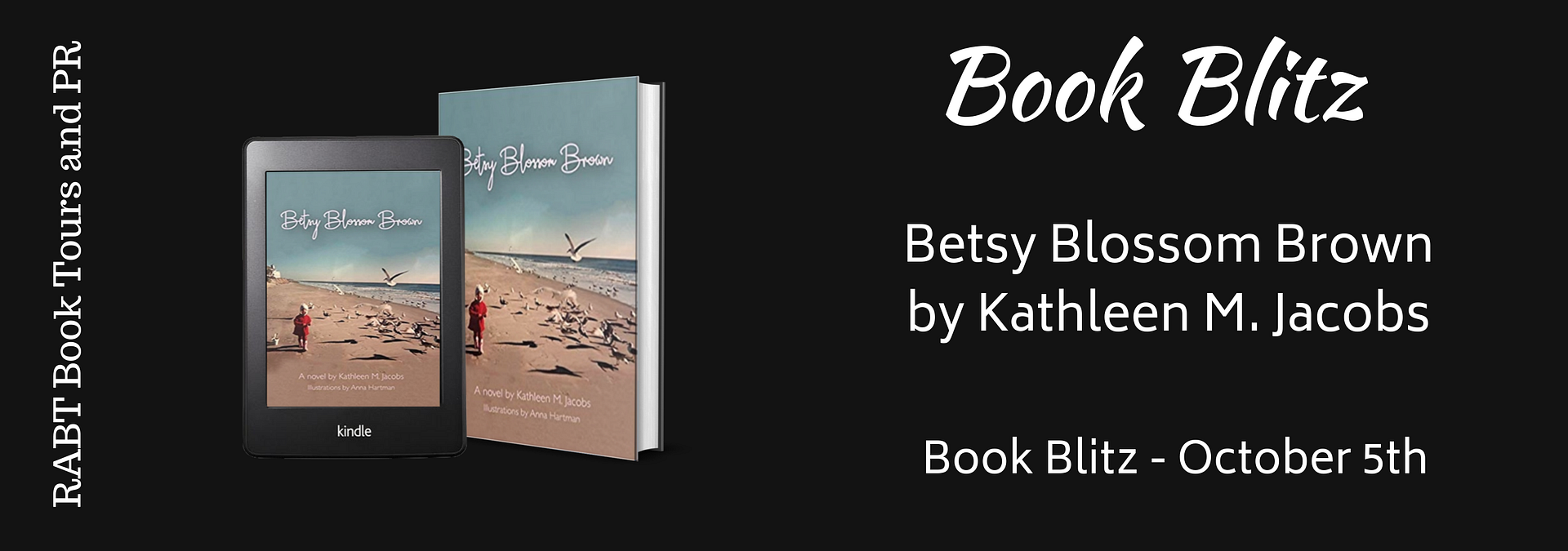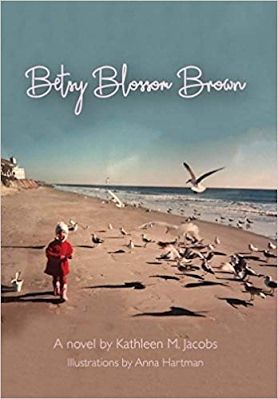Tag Archives: Kathleen M. Jacobs
Sophie & The Bookmobile Blitz
Comments Off on Sophie & The Bookmobile Blitz
Filed under BOOKS
Betsy Blossom Brown Tour

EXCERPT
No one told anyone else what Holden Whittenworth had done—or tried to do—to them. Each thought they were alone in their brokenness, and the feeling of being alone caused them to keep the secret—keep the ugliness as close as Holden Whittenworth had tried to violate. But as the silence grew and crescendoed, their whispered screams ricocheted off the mountains like buckshot. For whatever reason—shame, embarrassment, fear, ridicule—they held onto those violations, as if releasing them would cause an avalanche of unprecedented leveling. And yet, once the secret was revealed and that army of protection and defense built as if it had simply been in hibernation, waiting for a time to be called into service, they were suddenly armed with a deep conviction that retribution would not only be sought but achieved. And in the end, they were left with a cleansing that returned each of those who had been afflicted to a state of near-childlike innocence.
*
Holden Whittenworth had started his bullying with name-calling: for me and for Annie, it was “Aspies,” which was not foreign to either of us but still stung when vocalized. And after our initial infatuation with this Catholic boy from Pittsburgh began to dissipate a bit, we knew immediately after hearing “Aspies” that he was not who he pretended to be—once again, that revelation surprised me in the same way it did every time someone’s true identity was revealed. Annie and I linked arms and walked away, shaking our heads and rolling our eyes.
When Holden Whittenworth stooped to David Pepper’s height, asking him how the weather was down there, straightening and laughing as he walked around the corner of Court and Maple, David replied, “It’s just fine, Asshole, how is it way up where you are?” And we all noticed when Holden didn’t reply, instead pretending to get a call from his cell phone even though it hadn’t rung. And then everybody within earshot covered their laughter with their hands, and even Mr. Jennings, the bank president, tried to repress a chortle—without much success. And we all felt just a bit enabled.
And when Joey Parsons and a truckload of his friends, who were riding in the back of his camouflaged pick-up, drove through town one afternoon, Holden Whittenworth shouted, “Nice paint job, Hillbillies, or is it Mountaineers?” And when Joey slammed on his brakes, Holden ducked into the post office, nearly knocking over the postmistress, who was coming down the steps to pick up the afternoon mail from the mailbox. “Hey there,” Susie shouted. “Watch where you’re going, young feller.”
“Young feller? Where did you go to school, or did you go to school? Maybe you just went to postal clerk school,” Holden barked back.
“Well, in just about five minutes, when I’m no longer on the clock, you’ll find out just what kind of vocabulary I picked up during my time as an inner-city, high school English teacher in the exact part of the country you call home.” And Holden was suddenly silenced. Susie Cutright had a way with folks, and while she didn’t show it often, she had no problem exposing it when the time was right. And the time was more than right.
*
I stood in the school supplies aisle of Ben Franklin with an armload of packs of multi-colored construction paper, mechanical pencils, colored markers, and another wooden ruler. I never could work with a plastic ruler, although Annie was as resistant to my growing collection of wooden rulers. As I bent to retrieve a ream of lined, loose notebook paper from the lower shelf, an unfamiliar object pressed against my backside. It was hard, long, and intrusive in a way that was a bit similar to biting down on a plastic dental x-ray when it was placed at the back of an opened mouth, trying to reach even the hard-to-reach wisdom teeth. Every time dental x-rays were taken and the hygienist inserted that hard plastic inside my mouth, I gagged. And the ensuing seconds that followed were somehow excruciatingly painful, without much of an explanation. And yet, my anxiety intensified as the appointment drew closer.
And then, there was the push of the object at my backside as a hand was placed on each of my hips. And then, there was a voice whispering with the bluntness of a sharp object, “Don’t fucking move, you little whore.” And I didn’t. I couldn’t. I opened my mouth to scream, but nothing came out. Not one single sound. Just nothing. And then, there was another push so forceful that my head hit the edge of the shelving unit. And then he stopped and slapped my backside with the palm of his hand. I looked down to see his canvas boat shoes, a primitively-drawn raft etched a few weeks ago by Annie—shoes belonging to Holden Whittenworth.
Dropping my armload of supplies on the floor of Ben Franklin, I ran all the way home, stripped down to my bare skin, tossed my clothes into a plastic garbage bag, and showered underneath a stream of near-scalding water, soaping every inch of my body until it was beet red. I dressed, and found a corner to sob and rock back and forth, back and forth, until I stopped.
*
I never told anyone—not even my mother—what had happened that day in Ben Franklin. And every time I saw Holden Whittenworth, he would wink at me and grab his penis, his cock, his member, his whatever the hell he called it. I called it a piece of shit, but that’s just me. And then, one day, when Annie and I sat on the courthouse steps, eating from a handful of hot cashews from Ben Franklin and drinking a bottle of ice cold Coca-Cola, she began to cry. Holden Whittenworth was walking on the sidewalk across the street from us, rubbing his crotch. As he waved, Annie and I simultaneously flipped him the bird, and I knew that we both knew something had happened to each of us, although neither of us had to say a word.
“Annie?”
“Betsy?”
“What the hell?” we said in unison.
And then, again in unison, “I don’t want to talk about it.”
And once again in unison, “Me neither.”
“But, BB, I think we have to talk about it.”
“Maybe.”
And we both began to cry. And then we hugged each other, and Holden Whittenworth shouted, “Lesbos!”
And once again, we shouted in unison, “Lesbos is a Greek island, you dumb-ass!” And both of us made eye contact with Holden Whittenworth without any effort whatsoever, locking eyes until he looked away first.
“Annie, what happened?”
“You first,” she said.
After I recounted my afternoon in Ben Franklin to Annie, her tears fell with such fervor that I loved her at that moment perhaps more than I had ever loved her before. She sobbed uncontrollably, and her shoulders shook with the intensity of someone about to be pronounced “in shock.” And as she recounted her terrifying episode to me, I mimicked her every reaction, and the two of us suddenly became one—as one as we would ever become.
“I sat on the front porch swing one evening, exactly one week ago today. You and Billy Ray had driven into Beckley for a movie. I don’t even remember the name of it now. You had asked me to join you, but I knew you wanted to be with Billy by yourself. I really wanted to go because I’m so happy for you that you and Billy really like each other. I know that sounds a bit weird, but seeing you happy with Billy makes me happy, and the two of you just seem to fit together like pieces of a puzzle that has yet to be completed. Anyway, your mom and Aunt Penelope had gone to Pies & Pints for dinner, and I was just reading a book. And I can’t even remember the name of the book any more than I can remember the name of the movie you and Billy went to see. And don’t try to help me remember either. I don’t want to remember. And yet, I don’t want to forget what happened to me that evening either. None of it. It’s actually maddening.
Anyway, Holden scared the shit out of me, because I hadn’t even heard him walk by, but I did hear him say, “Hey, you little, hot bitch. I bet you’d be a great fuck. I bet you’ve never had it stuck to you, have you? And I bet you’d love it too. You’d probably want it all the time once you had mine.”
I jumped up from the porch swing to run, but he grabbed me so quickly and so intensely that I couldn’t for the life of me figure out how he was so lightning fast in getting to the porch. And then, he put his hand over my mouth, reached up inside my shorts, and grabbed my crotch. All the time, he was pushing his dick against my backside. I screamed, but his hand was clamped against my mouth. And then I reached up with my hand and scratched the shit out of his face. He released me as he screamed out in pain, and I ran inside the house, bolting the front door. And, like you, I showered myself raw and told no one until now.”
Our Coca-Colas had grown warm and flat, our salted palms were saturated with our tears, and our loss of something so pure, so irreplaceable melded together and became something that would forever join us, no matter what direction our lives took or where we might eventually land.
*
Over the course of the remaining days, the Catholic boys from Pittsburgh repaired dilapidated houses for the people in rural Fayette County during the daylight hours, Holden Whittenworth violated at least a dozen Fayetteville High School female students throughout the early and late evening hours, and a damaged but not destroyed group gathered Billy Ray, his friends, Billy’s father, Sheriff Deel, and Judge Armstrong together to seek a very silent but resounding vindication.
Around 5:00 a.m., on the morning the Pittsburgh Catholic crew was scheduled to leave Fayetteville, a motorcade of cars, trucks, and bikers from Albert Portly’s Harley-Davidson Biker’s Club parked outside Brown’s Motor Lodge on Rt. 19, waiting to escort the crew out of town. When they exited their rooms, they were clearly hung-over from the night before; their backpacks and duffle bags were filled with weeks of dirty laundry, disgusting briefs, and stinky athletic socks; their hair was slicked back as if fresh from a hot shower; and they struck matches to their cigarettes, patting each other on their backs for a job well-done.
The lead truck, driven by Joey Parsons, turned on his high beams, beeped his horn, and blinded every single Catholic boy from Pittsburgh, causing them to drop their bags and shout, “What the hell,” like a band of canaries. Sheriff Deel emerged from his cruiser, tapping his sidearm in his holster, and Judge Armstrong, in full judicial dress, stepped out from his shiny, black, brand new Lincoln SUV. Almost immediately, a stench permeated the early morning air, and Billy Ray’s father said, “Well, boys, I do believe we’ve got their attention.” And it was our team’s turn to laugh—heartily and with just the certain amount of righteous indignation, the unofficial but very prevalent religion that coursed through the veins of everyone throughout this region called Appalachia.
And suddenly, as if on cue, every single girl who had been violated in one way or another by Holden Whittenworth emerged from vehicles driven by fathers and grandfathers, uncles and brothers. And as the Pittsburgh Catholic crew scrambled to find shelter in their own vehicles, Judge Armstrong said, “Not so fast, boys. We’ll be providing your escort out of town, and we’ll take it real slow. There’s a bunch of folks—actually more than a bunch—who want to make sure you depart with the welcome you arrived, with a slight tweak here and there.”
As the snail-paced motorcade—the line-up of Catholic boys sandwiched in-between—made its way north on Rt. 19, headlights flooded both sides of the highway and every roadway and overpass for as far as the eye could see. And draped over the pedestrian walkway that spanned Rt. 19 was a banner that read, in crimson, the following:
“Put on the full armor of God, so that you can take your stand
against the devil’s schemes. For our struggle is . . . against the
powers of this dark world and against the spiritual forces of
evil . . . Therefore, put on the full armor of God, so that when
the day of evil comes, you may be able to stand your ground . . .
Take up the shield of faith, with which you can extinguish all
the flaming arrows of the evil one.” Ephesians 6:10–18.
And for miles and miles along the length of the New River Gorge Bridge, one torch after another was lit, guiding the motorcade, as television cameras filmed the crew’s exit, and all but the head of each car’s driver headed north to Pittsburgh. And it seemed as if everyone who was headed back to those big city lights reached with great exertion the level of the Gorge’s lowest point, and Betsy Blossom Brown knew that she was safe—something she would know for the rest of her life.
Filed under BOOKS
Betsy Blossom Brown Blitz

Filed under BOOKS




